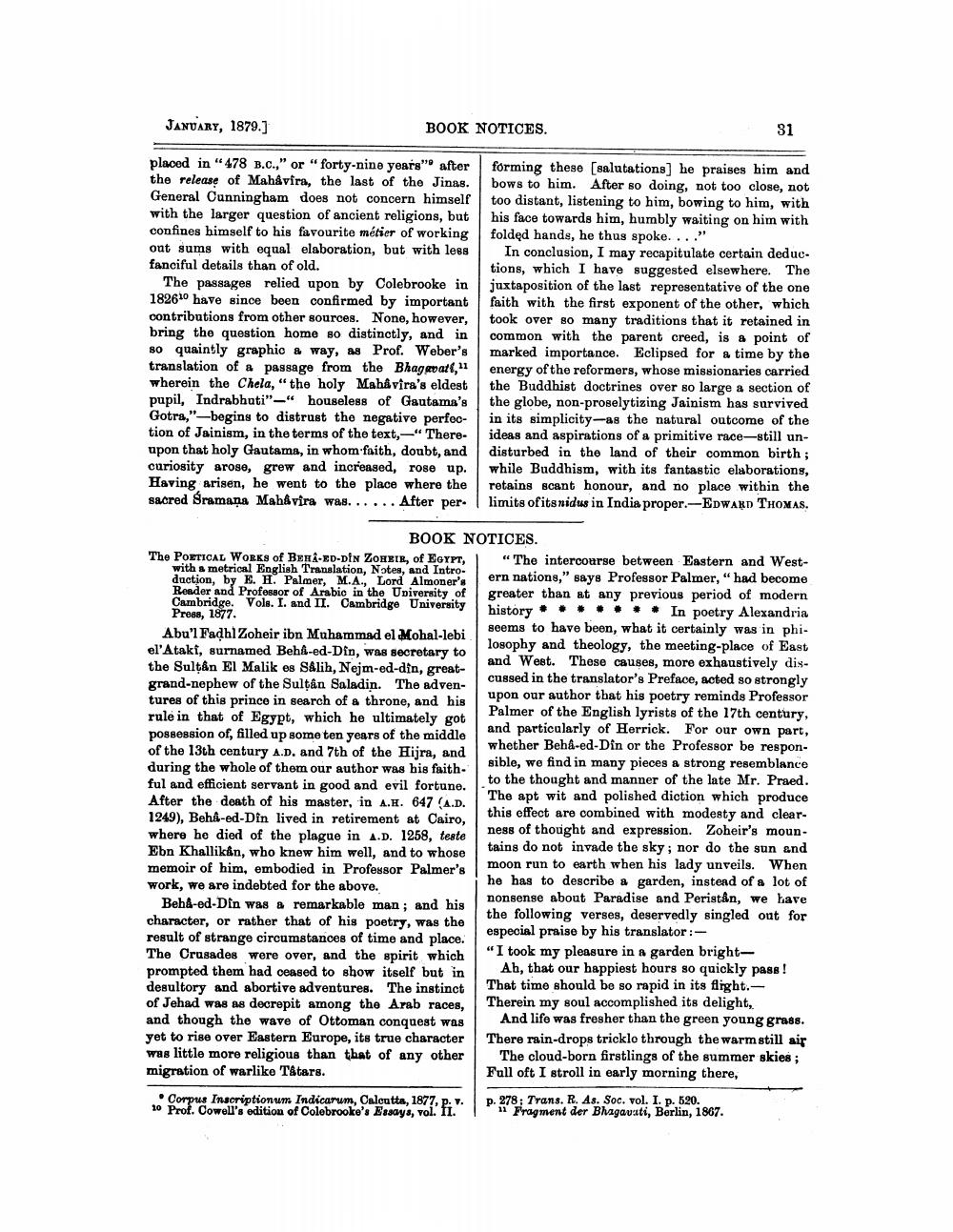________________
JANUARY, 1879.]
BOOK NOTICES.
31
placed in " 478 B.C.," or "forty-nine years" after forming these (salutations] he praises him and the release of Mahåvira, the last of the Jinas. bows to him. After so doing, not too close, not General Cunningham does not concern himself too distant, listening to him, bowing to him, with with the larger question of ancient religions, but his face towards him, humbly waiting on him with confines himself to his favourite métier of working folded hands, he thus spoke...."
at sums with equal elaboration, but with less In conclusion, I may recapitulate certain deducfanciful details than of old.
tions, which I have suggested elsewhere. The The passages relied upon by Colebrooke in juxtaposition of the last representative of the one 182610 have since been confirmed by important faith with the first exponent of the other, which contributions from other sources. None, however, took over so many traditions that it retained in bring the question home so distinctly, and in common with the parent creed, is a point of 80 quaintly graphic & way, as Prof. Weber's marked importance. Eclipsed for a time by the translation of a passage from the Bhagavat6,11 energy of the reformers, whose missionaries carried wherein the Chela," the holy Mahavira's eldest the Buddhist doctrines over so large a section of pupil, Indrabhati"-" houseless of Gautama's the globe, non-proselytizing Jainism has survived Gotra,"-begins to distrust the negative perfec- in its simplicity-as the natural outcome of the tion of Jainism, in the terms of the text, -" There. ideas and aspirations of a primitive race-still unupon that holy Gautama, in whom-faith, doubt, and disturbed in the land of their common birth; curiosity arose, grew and increased, rose up. while Buddhism, with its fantastic elaborations, Having arisen, he went to the place where the retains scant honour, and no place within the sacred Gramana Mah&vira was. . . . . . After per. | limits of its nidus in India proper.-EDWARD THOMAS.
BOOK NOTICES. The POETICAL WORKS of BEHA-ED-DİN ZORRIR, of EGYPT, « The intercourse between Eastern and West
with a metrical English Translation, Notes, and Intro. duction, by E. H. Palmer, M.A, Lord Almoner's ern nations," says Professor Palmer, "had become Reader and Professor of Arabic in the University of greater than at any previous period of modern Cambridge. Vols. I. and II. Cambridge University Press, 1877.
history . . # # # # # In poetry Alexandria
seems to have been, what it certainly was in phiAbu'l Fadhi Zoheir ibn Muhammad el Mohal-lebi el'Atakt, surnamed Behf-ed-Din, was secretary to
losophy and theology, the meeting-place of East
and West. These causes, more exhaustively disthe Sultan El Malik es Sâlih, Nejm-ed-din, greatgrand-nephew of the Sultan Saladin. The adven
cussed in the translator's Preface, acted so strongly tures of this prince in search of a throne, and his
upon our author that his poetry reminds Professor rule in that of Egypt, which he ultimately got
Palmer of the English lyrists of the 17th century, possession of, filled up some ten years of the middle
and particularly of Herrick. For our own part,
whether Beha-ed-Din or the Professor be responof the 13th century A.D. and 7th of the Hijra, and
sible, we find in many pieces a strong resemblance during the whole of them our author was his faith ful and efficient servant in good and evil fortune.
to the thought and manner of the late Mr. Praed.
The apt wit and polished diction which produce After the death of his master, in A... 647 (A.D.
this effect are combined with modesty and clear1249), Beh-ed-Din lived in retirement at Cairo, where he died of the plague in A.D. 1258, teste
ness of thought and expression. Zoheir's mounEbn Khallikin, who knew him well, and to whose
tains do not invade the sky; nor do the sun and memoir of him, embodied in Professor Palmer's
moon run to earth when his lady unveils. When work, we are indebted for the above.
he has to describe a garden, instead of a lot of
nonsense about Paradise and Peristån, we have Beh-ed-Din was a remarkable man; and his
the following verses, deservedly singled out for character, or rather that of his poetry, was the
especial praise by his translator :result of strange circumstances of time and place. The Crusades were over, and the spirit which
"I took my pleasure in a garden brightprompted them had ceased to show itself but in
Ah, that our happiest hours so quickly pass! desultory and abortive adventures. The instinct
That time should be so rapid in its flight.of Jehad was as decrepit among the Arab races,
Therein my soul accomplished its delight, and though the wave of Ottoman conquest was
And life was fresher than the green young grass. yet to rise over Eastern Europe, its true character There rain-drops tricklo through the warm still air was little more religious than that of any other The cloud-born firstlings of the summer skies; migration of warlike Tatars.
Full oft I stroll in early morning there,
Corpus Inscriptionum Indicarum, Calcutta, 1877, p. V. 10 Prof. Cowell's edition of Colebrooke's Besavs. vol. .
I
p. 278; Trans. R. 48. Soc. vol. I. p. 520.
u Fragment der Bhagavati. Borlin. 1867.




